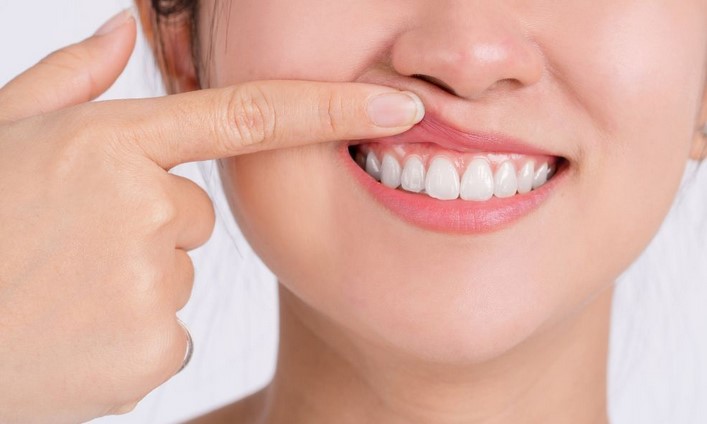Recession of Gums: Causes, Prevention, and Treatment Options

Recession of gums is a common dental condition that occurs when the gum tissue surrounding the teeth begins to pull away from the teeth, exposing the root of the tooth. This can cause sensitivity, pain, and even tooth loss if left untreated. The causes of gum recession can vary, but some of the most common causes include periodontal disease, aggressive brushing, and misaligned teeth. Fortunately, there are ways to prevent and treat gum recession. This article will discuss the causes, prevention, and treatment options for gum recession.
Understanding Recession of Gums: Causes, Symptoms, and Treatment Options
Recession of gums is a common dental condition that affects many people. It occurs when the gum tissue around the teeth begins to pull away from the teeth, exposing the roots of the teeth. This can cause sensitivity, pain, and even tooth loss if left untreated. In this article, we will discuss the causes, symptoms, and treatment options for recession of gums.
Causes of Recession of Gums
There are several potential causes of recession of gums. These include:
• Aggressive brushing: Brushing too hard or using a hard-bristled toothbrush can cause the gums to recede.
• Periodontal disease: Periodontal disease is an infection of the gums that can cause them to recede.
• Genetics: Some people are more prone to gum recession due to their genetics.
• Tobacco use: Smoking or chewing tobacco can cause the gums to recede.
• Poor oral hygiene: Not brushing and flossing regularly can lead to gum recession.
Symptoms of Recession of Gums
The most common symptom of gum recession is sensitivity to hot and cold temperatures. Other symptoms include:
• Exposed tooth roots: The roots of the teeth may become visible due to the receding gums.
• Tooth mobility: The teeth may become loose due to the lack of support from the gums.
• Gum pain: The gums may become tender and painful due to the recession.
• Bad breath: The exposed roots of the teeth can cause bad breath.
Treatment Options for Recession of Gums
The treatment for gum recession depends on the cause and severity of the condition. Treatment options include:
• Scaling and root planing: This is a deep cleaning procedure that removes plaque and tartar from the teeth and gums.
• Gum grafting: This procedure involves taking tissue from another part of the mouth and grafting it onto the receding gums.
• Antibiotics: Antibiotics may be prescribed to treat any underlying infection.
• Surgery: In some cases, surgery may be necessary to correct the gum recession.
Conclusion
Recession of gums is a common dental condition that can cause sensitivity, pain, and even tooth loss if left untreated. The causes of gum recession include aggressive brushing, periodontal disease, genetics, tobacco use, and poor oral hygiene. The symptoms of gum recession include exposed tooth roots, tooth mobility, gum pain, and bad breath. Treatment options for gum recession include scaling and root planing, gum grafting, antibiotics, and surgery.
Preventing Recession of Gums: Tips for Maintaining Healthy Gums
Maintaining healthy gums is an important part of overall oral health. Receding gums can lead to a number of problems, including tooth sensitivity, infection, and even tooth loss. Fortunately, there are a few simple steps you can take to help prevent recession of your gums.
1. Brush and Floss Regularly: Brushing and flossing your teeth twice a day is essential for keeping your gums healthy. Make sure to use a soft-bristled toothbrush and fluoride toothpaste. When flossing, be gentle and use a sawing motion to avoid damaging your gums.
2. Use an Antiseptic Mouthwash: An antiseptic mouthwash can help reduce the bacteria in your mouth that can lead to gum disease. Look for a mouthwash that contains chlorhexidine or cetylpyridinium chloride.
3. Avoid Tobacco Products: Smoking and chewing tobacco can increase your risk of gum recession. If you use tobacco products, talk to your dentist about ways to quit.
4. Visit Your Dentist Regularly: Regular dental checkups are important for maintaining healthy gums. Your dentist can check for signs of gum disease and provide treatment if necessary.
5. Eat a Balanced Diet: Eating a balanced diet that includes plenty of fruits and vegetables can help keep your gums healthy. Avoid sugary and acidic foods, which can damage your teeth and gums.
By following these tips, you can help prevent recession of your gums and keep your mouth healthy. If you have any questions or concerns about your oral health, be sure to talk to your dentist.The recession of gums is a common dental issue that can cause discomfort and even lead to tooth loss if left untreated. Fortunately, there are a variety of causes, prevention, and treatment options available to help prevent and treat gum recession. Regular dental visits, good oral hygiene, and lifestyle changes can help prevent gum recession. If gum recession has already occurred, there are a variety of treatments available, including scaling and root planing, gum grafting, and laser therapy. It is important to consult with a dentist to determine the best treatment option for your individual needs.